#not with neil particularly but with good omens
Text
i just read "neilgaiman" instead of "nailglam"
#lmao#sometimes shit like that happens and you're just like#i might be a little obsessed#not with neil particularly but with good omens#even though i really like neil as far as i can tell#can't wait to read more of his stories#simultaneously hoping he'll never see this while also hoping he does and has a little laugh haha#neil gaiman#good omens#good omens fandom#turtely's op
6 notes
·
View notes
Text
there's a quote from neil gaiman on the front cover of my copy of lud-in-the-mist so i keep being reminded of the current controversy re him and my main takeaway from that whole thing is that it's pretty disgusting to me how many people were willing to go straight to 'this must be a conspiracy to take him down' and playing down the accusations and generally being completely unwilling to believe that maybe the man they admire is a bit of a shit
then again, i don't know what else to expect given that is the pattern every time a popular man gets accused of something terrible
#like cmon guys#i suppose tho that i have the benefit of never having been a big neil gaiman fan so it's not something i have to grapple with particularly#i think of his works ive only read sandman and american gods* so i have no strong attachment to deal with#which i imagine makes it easier for me to just go 'well fuck that guy'#but all the same... can we please stop doing this defensive bullshit every time a man is accused of something thank you#*oh and good omens but i always think of that more for terry than for him
10 notes
·
View notes
Text
The only way I would've accepted seeing pre-fall Crowley and Aziraphale together is if they were like in the Heaven cafeteria, Crowley complaining to a celestial dinnerlady that the lunch options all look bad ("the food hadn't been that good lately"), while Aziraphale walks by in the other direction, needlessly worrying about something. Neither notices the other. They were this close and yet!
Perhaps Aziraphale and another angel are even discussing some rumour about angels starting to ask questions of The Almighty and expresses concern.
Keep in the "how much trouble can I get into for asking a few questions?" or whatever from Crowley but have it be with the disgruntled dinnerlady or one of Lucifer's crew he was presumably hanging out with. Show one of these soon-to-be-cast-out angels casually mentioning to him that they're thinking of bringing up a few of their concerns to "the boss" and would he be interested? It's worth a shot after all. What harm could it to?
Just anything to make it less fucking needlessly dramatic and serious.
#good omens critical#keep it light and comedic!!!!#let crowley be a bit snakey and a bit of a rude shit#he fell in with the wrong crowd fucked around and found out#he doesn't HATE hate his job he just doesn't like acting with his hellish superiors and 2 particularly nasty coworkers#and canonically believes humans can be mucj worse than demons anyway due to our imaginative abilities#and if neil still needed crowley to seem more fundamentally Good as a character then have the other angel(s) manipulate him a little#“mate you're not like these other drones - you're a free thinker! you've got tons of great ideas!”#“you're popular with Them Upstairs - They respect your vision. come with us and we can actually make some inprovements around here”#could've even had pre-fall furfur or shax or those demons with the horn hair whose name I can never remember having around in the scene#establish that they'd Always Been There#and providing a little visual gag#I knew we had a problem as soon as crowley described himself as saunterinf vaguely downwards in s1#because then it became subjective#rather than an objective description of the character given by the authors#it was now crowley's chosen narrative about his fall#and then we got him angsting in his apartment#and crying in the pub#and it was like 'oh for this crowley its just a story hes constructed about himself to put up a protective wall amount his Big Emotions'#and I did not care for it!!!!#etc
46 notes
·
View notes
Text
On my shelf at work. Clearly one of his finer works. Has generated enormous quantities of low grade evil from scientists everywhere.
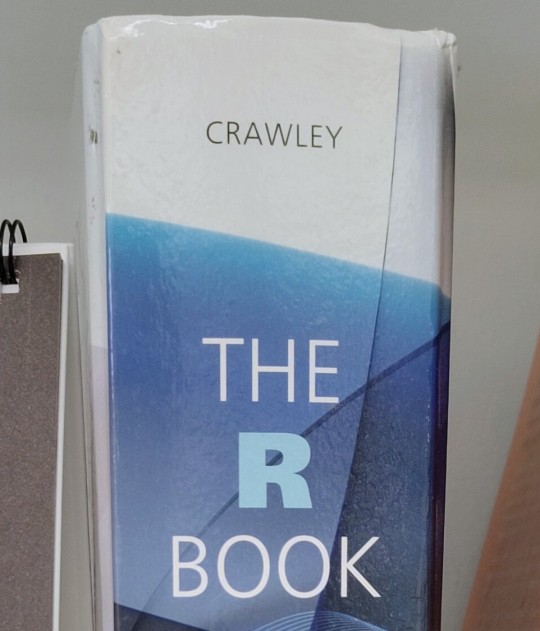
#good omens#the demon Crowley#R#r stats#programming#statistics#Crowley#Crawley#low grade evil#computational biologists see what you did there#we wouldnt change it though happy to give ourselves to hell in exchange for R#crowley made this#neil gaiman#terry pratchett#r is a statistical programming language used a wide range of fields but particularly in the sciences#my post#my photos#original post#crossover#science X Good Omens
5 notes
·
View notes
Text
Hello @neil-gaiman! What do you think about that?
0 notes
Text
How Michael Met Neil
original direct link [MP3]
(Neil, if you see this, please feel free to grab the transcript and store on your site; I had no easy way of contacting you.)
DAVID TENNANT: Tell me about @neil-gaiman then, because he's in that category [previously: “such a profound effect on my life”] as well.
MICHAEL SHEEN: So this is what has brought us together.
DAVID: Yes.
MICHAEL: To the new love story for the 21st century.
DAVID: Exactly.
MICHAEL: So when I went to drama school, there was a guy called Gary Turner in my year. And within the first few weeks, we were doing something, having a drink or whatever. And he said to me, “Do you read comic books?”
And I said, “No.” I mean, this is … what … '88? '88, '89. So it was … now I know that it was a period of time that was a big change, transformation going through comic books. Rather than it being thought of as just superheroes and Batman and Superman, there was this whole new era of a generation of writers like Grant Morrison.
DAVID: The kids who'd grown up reading comic books were now making comic books
MICHAEL: Yeah, yeah, and starting to address different kinds of subjects through the comic book medium. So it wasn't about just superheroes, it was all kinds of stuff going on – really fascinating stuff. And I was totally unaware of this.
And so this guy Gary said to me, "Do you read them?" And I said, "No." And he went, "Right, okay, here's The Watchman [sic] by Alan Moore. Here's Swamp Thing. Here's Hellblazer. And here's Sandman.”
And Sandman was Neil Gaiman's big series that put his name on the map. And I read all those, and, just – I was blown away by all of them, but particularly the Sandman stories, because he was drawing on mythology, which was something I was really interested in, and fairy tales, folklore, and philosophy, and Shakespeare, and all kinds of stuff were being mixed up in this story. And I absolutely loved it.
So I became a big fan of Neil's, and started reading everything by him. And then fairly shortly after that, within six months to a year, Good Omens the book came out, which Neil wrote with Terry Pratchett. And so I got the book – because I was obviously a big fan of Neil's by this point – read it, loved it, then started reading Terry Pratchett’s stuff as well, because I didn't know his stuff before then – and then spent years and years and years just being a huge fan of both of them.
And then eventually when – I'd done films like the Underworld films and doing Twilight films. And I think it was one of the Twilight films, there was a lot of very snooty interviews that happened where people who considered themselves well above talking about things like Twilight were having to interview me … and, weirdly, coming at it from the attitude of 'clearly this is below you as well' … weirdly thinking I'm gonna go, 'Yeah, fucking Twilight.”
And I just used to go, "You know what? Some of the greatest writing of the last 50-100 years has happened in science fiction or fantasy." Philip K Dick is one of my favorite writers of all time. In fact, the production of Hamlet I did was mainly influenced by Philip K Dick. Ursula K. Le Guin and Asimov, and all these amazing people. And I talked about Neil as well. And so I went off on a bit of a rant in this interview.
Anyway, the interview came out about six months later, maybe. Knock on the door, open the door, delivery of a big box. That’s interesting. Open the box, there's a card at the top of the box. I open the card.
It says, From one fan to another, Neil Gaiman. And inside the box are first editions of Neil's stuff, and all kinds of interesting things by Neil. And he just sent this stuff.
DAVID: You'd never met him?
MICHAEL: Never met him. He'd read the interview, or someone had let him know about this interview where I'd sung his praises and stood up for him and the people who work within that sort of genre as being like …
And he just got in touch. We met up for the first time when he came to – I was in Los Angeles at the time, and he came to LA. And he said, "I'll take you for a meal."
I said, “All right.”
He said, "Do you want to go somewhere posh, or somewhere interesting?”
I said, "Let's go somewhere interesting."
He said, "Right, I'm going to take you to this restaurant called The Hump." And it's at Santa Monica Airport. And it's a sushi restaurant.
I was like, “Right, okay.” So I had a Mini at the time. And we get in my Mini and we drive off to Santa Monica Airport. And this restaurant was right on the tarmac, like, you could sit in the restaurant (there's nobody else there when we got there, we got there quite early) and you're watching the planes landing on Santa Monica Airport. It's extraordinary.
And the chef comes out and Neil says, "Just bring us whatever you want. Chef's choice."
So, I'd never really eaten sushi before. So we sit there; we had this incredible meal where they keep bringing these dishes out and they say, “This is [blah, blah, blah]. Just use a little bit of soy sauce or whatever.” You know, “This is eel. This is [blah].”
And then there was this one dish where they brought out and they didn't say what it was. It was like “mystery dish”, we had it ... delicious. Anyway, a few more people started coming into the restaurant as time went on.
And we're sort of getting near the end, and I said, "Neil, I can't eat anymore. I'm gonna have to stop now. This is great, but I can't eat–"
"Right, okay. We'll ask for the bill in a minute."
And then the door opens and some very official people come in. And it was the Feds. And the Feds came in, and we knew they were because they had jackets on that said they were part of the Federal Bureau of Whatever. And about six of them come in. Two of them go … one goes behind the counter, two go into the kitchen, one goes to the back. They've all got like guns on and stuff.
And me and Neil are like, "What on Earth is going on?"
And then eventually one guy goes, "Ladies and gentlemen, if you haven't ordered already, please leave. If you're still eating your meal, please finish up, pay your bill, leave."*
[* - delivered in a perfect American ‘serious law agent’ accent/impression]
And we were like, "Oh my God, are we poisoned? Is there some terrible thing that's happened?"
We'd finished, so we pay our bill. And then all the kitchen staff are brought out. And the head chef is there. The guy who's been bringing us this food. And he's in tears. And he says to Neil, "I'm so sorry." He apologizes to Neil. And we leave. We have no idea what happened.
DAVID: But you're assuming it's the mystery dish.
MICHAEL: Well, we're assuming that we can't be going to – we can't be – it can't be poisonous. You know what I mean? It can't be that there's terrible, terrible things.
So the next day was the Oscars, which is why Neil was in town. Because Coraline had been nominated for an Oscar. Best documentary that year was won by The Cove, which was by a team of people who had come across dolphins being killed, I think.
Turns out, what was happening at this restaurant was that they were having illegal endangered species flown in to the airport, and then being brought around the back of the restaurant into the kitchen.
We had eaten whale – endangered species whale. That was the mystery dish that they didn't say what it was.
And the team behind The Cove were behind this sting, and they took them down that night whilst we were there.
DAVID: That’s extraordinary.
MICHAEL: And we didn't find this out for months. So for months, me and Neil were like, "Have you worked anything out yet? Have you heard anything?"
"No, I haven't heard anything."
And then we heard that it was something to do with The Cove, and then we eventually found out that that restaurant, they were all arrested. The restaurant was shut down. And it was because of that. And we'd eaten whale that night.
DAVID: And that was your first meeting with Neil Gaiman.
MICHAEL: That was my first meeting. And also in the drive home that night from that restaurant, he said, and we were in my Mini, he said, "Have you found the secret compartment?"
I said, "What are you talking about?" It's such a Neil Gaiman thing to say.
DAVID: Isn't it?
MICHAEL: The secret compartment? Yeah. Each Mini has got a secret compartment. I said, "I had no idea." It's secret. And he pressed a little button and a thing opened up. And it was a secret compartment in my own car that Neil Gaiman showed me.
DAVID: Was there anything inside it?
MICHAEL: Yeah, there was a little man. And he jumped out and went, "Hello!" No, there was nothing in there. There was afterwards because I started putting...
DAVID: Sure. That's a very Neil Gaiman story. All of that is such a Neil Gaiman story.
MICHAEL: That's how it began. Yeah.
DAVID: And then he came to offer you the part in Good Omens.
MICHAEL: Yeah. Well, we became friends and we would whenever he was in town, we would meet up and yeah, and then eventually he started, he said, "You know, I'm working on an adaptation of Good Omens." And I can remember at one point Terry Gilliam was going to maybe make a film of it. And I remember being there with Neil and Terry when they were talking about it. And...
DAVID: Were you involved at that point?
MICHAEL: No, no, I wasn't involved. I just happened to have met up with Neil that day.
DAVID: Right.
MICHAEL: And then Terry Gilliam came along and they were chatting, that was the day they were talking about that or whatever.
And then eventually he sent me one of the scripts for an early draft of like the first episode of Good Omens. And he said – and we started talking about me being involved in it, doing it – he said, “Would you be interested?” I was like, "Yeah, of course." I went, "Oh my God." And he said, "Well, I'll send you the scripts when they come," and I would read them, and we'd talk about them a little bit. And so I was involved.
But it was always at that point with the idea, because he'd always said about playing Crowley in it. And so, as time went on, as I was reading the scripts, I was thinking, "I don't think I can play Crowley. I don't think I'm going to be able to do it." And I started to get a bit nervous because I thought, “I don't want to tell Neil that I don't think I can do this.” But I just felt like I don't think I can play Crowley.
DAVID: Of course you can [play Crowley?].
MICHAEL: Well, I just on a sort of, on a gut level, sometimes you have it on a gut level.
DAVID: Sure, sure.
MICHAEL: I can do this.
DAVID: Yeah.
MICHAEL: Or I can't do this. And I just thought, “You know what, this is not the part for me. The other part is better for me, I think. I think I can do that, I don't think I could do that.”
But I was scared to tell Neil because I thought, "Well, he wants me to play Crowley" – and then it turned out he had been feeling the same way as well. And he hadn't wanted to mention it to me, but he was like, "I think Michael should really play Aziraphale."
And neither of us would bring it up. And then eventually we did. And it was one of those things where you go, "Oh, thank God you said that. I feel exactly the same way." And then I think within a fairly short space of time, he said, “I think we've got … David Tennant … for Crowley.” And we both got very excited about that.
And then all these extraordinary people started to join in. And then, and then off we went.
DAVID: That's the other thing about Neil, he collects people, doesn't he? So he'll just go, “Oh, yeah, I've phoned up Frances McDormand, she's up for it.” Yeah. You're, what?
MICHAEL: “I emailed Jon Hamm.”
DAVID: Yeah.
MICHAEL: And yeah, and you realize how beloved he is and how beloved his work is. And I think we would both recognise that Good Omens is one of the most beloved of all of Neil's stuff.
DAVID: Yes.
MICHAEL: And had never been turned into anything.
DAVID: Yeah.
MICHAEL: And so the kind of responsibility of that, I mean, for me, for someone who has been a fan of him and a fan of the book for so long, I can empathize with all the fans out there who are like, “Oh, they better not fuck this up.”
DAVID: Yes.
MICHAEL: “And this had better be good.” And I have that part of me. But then, of course, the other part of me is like, “But I'm the one who might be fucking it up.”
DAVID: Yeah.
MICHAEL: So I feel that responsibility as well.
DAVID: But we have Neil on site.
MICHAEL: Yes. Well, Neil being the showrunner …
DAVID: Yeah. I think it takes the curse off.
MICHAEL: … I think it made a massive difference, didn't it? Yeah. You feel like you're in safe hands.
DAVID: Well, we think. Not that the world has seen it yet.
MICHAEL (grimly): No, I know.
DAVID: But it was a -- it's been a -- it's been a joy to work with you on it. I can't wait for the world to see it.
MICHAEL: Oh my God. Oh, well, I mean, it's the only, I've done a few things where there are two people, it's a bit of a double act, like Frost-Nixon and The Queen, I suppose, in some ways. But, and I've done it, Amadeus or whatever.
This is the only thing I've done where I really don't think of it as “my character” or “my performance as that character”. I think of it totally as us.
DAVID: Yeah.
MICHAEL: The two of us.
DAVID: Yes.
MICHAEL: Like they, what I do is defined by what you do.
DAVID: Yeah.
MICHAEL: And that was such a joy to have that experience. And it made it so much easier in a way as well, I found, because you don't feel like you're on your own in it. Like it's totally us together doing this and the two characters totally complement each other. And the experience of doing it was just a real joy.
DAVID: Yeah. Well, I hope the world is as excited to see it as we are to talk about it, frankly.
MICHAEL: You know, there's, having talked about T.S. Eliot earlier, there's another bit from The Wasteland where there's a line which goes, These fragments I have shored against my ruin.
And this is how I think about life now. There is so much in life, no matter what your circumstances, no matter what, where you've got, what you've done, how much money you got, all that. Life's hard. I mean, you can, it can take you down at any point.
You have to find this stuff. You have to like find things that will, these fragments that you hold to yourself, they become like a liferaft, and especially as time goes on, I think, as I've got older, I've realized it is a thin line between surviving this life and going under.
And the things that keep you afloat are these fragments, these things that are meaningful to you and what's meaningful to you will be not-meaningful to someone else, you know. But whatever it is that matters to you, it doesn't matter what it was you were into when you were a teenager, a kid, it doesn't matter what it is. Go and find them, and find some way to hold them close to you.
Make it, go and get it. Because those are the things that keep you afloat. They really are. Like doing that with him or whatever it is, these are the fragments that have shored against my ruin. Absolutely.
DAVID: That's lovely. Michael, thank you so much.
MICHAEL: Thank you.
DAVID: For talking today and for being here.
MICHAEL: Oh, it's a pleasure. Thank you.
#neil gaiman#michael sheen#david tennant does a podcast with...#good omens#aziraphale#crowley#sushi#whale#the cove#oscars 2010#coraline#mini secret compartments#howneilmetmichael#howmichaelmetneil
5K notes
·
View notes
Text
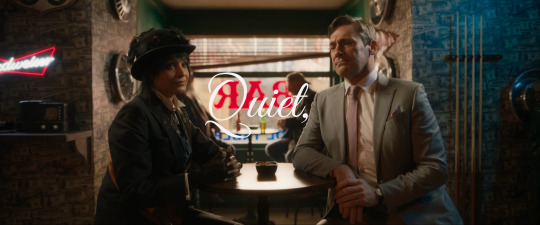

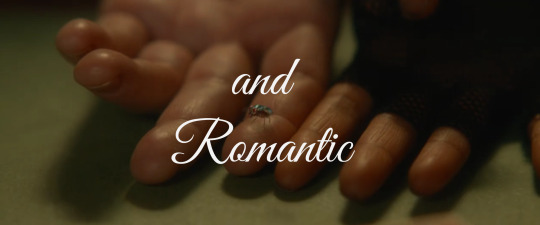
An Asexual's love letter to Good Omens 2
There's an infamous quote by Neil Gaiman going around, regarding the general vibe of season 2, and many people (I believe humorously) yelling that it could not be further from the truth. Particularly in the last episode, where that happens.
I disagree.
The final episode of season 2 was deeply, deeply comforting to me.
I am asexual. Have been my whole life. Even before I had the words to describe what that was, child-me had this feeling in their gut of being an outlier, that everyone was exaggerating, or in on some joke, that I wasn’t privy to. Because I was bombarded on all sides by shows and movies and books, telling the same story of love, again, and again, and AGAIN. It’s drilled into our brains with the same fervor as the days of the week, or the quadratic formula. Meet-cute -> misunderstanding ->declaration of feelings ->kiss. More or less steps can be added to account for runtime or complexity of narrative, but that’s the basic structure that a relationship follows. It MUST be, because that’s the formula every character who's ever been in a story goes through, often times when it even feels like an add-on, like it’s only there because this is a story, there HAS to be a romance. And it has to follow the steps.
For a long time, I felt love wasn’t for me, because if there’s only one way to be in love, I sure as hell wasn’t feeling it.
Instead, the relationship I ended up in looked a lot like what Beezlebub and Gabriel go through. Meeting someone routinely until it starts to feel comfortable. Getting to know them and slowly growing more attached. Eating chips and listening to music.
We like to joke whenever someone asks us how long we’ve been together, because the answer is we just sort of slowly fell into it, and we honestly don’t know when the line got blurred between ‘friends’ and ‘partners’. And, at least for me, a good deal of that confusion, that hesitancy to label, came from the fact that what I was feeling, what we were, couldn’t be love. It couldn’t be romantic.
We were just quiet and gentle.
And that wasn’t love.
Because it was slow, because it wasn’t physical, because there was no structure aside from consistency and companionship. Because it didn’t follow the Rules.
Then I found myself in stories, and it felt like a revelation.
Beelzebub and Gabriel aren’t the first time I’ve seen a love like I feel represented in a narrative, but it never stops feeling special. And I don’t know if I’ll ever stop celebrating it.
Throughout the sequence in the pub, I kept expecting them to “confirm” Gabriel and Beelzebub. A dramatic line, a kiss, a whatever. That’s what I’ve been taught to expect, after all, that’s the only way a relationship is “real”. Of course, this doesn't mean Crowley and Aziraphale sharing a dramatic kiss is wrong, or that I can’t see why it resonated with so many people, but for me. Those moments in the pub are worth so much more.The last scene might have been literally showstopping, but those handful of moments between the duke of hell and an archangel were the beating heart of the season for me. A simple love story in four scenes. No kisses. No ‘I love you’s. Not even any definition of what. The love Gabriel and Beelzebub have is strong enough for them to both want to shatter their worlds and flee their lives and it's just.
It's just that.
Two people in a pub, playing the other's favorite song, giving a little gift, buying a packet of crisps.
That sequence means far more to me than any kiss ever could.
Love isn’t only real when it's hot and sudden and ephemeral, it can also be
Quiet.
And gentle.
And still romantic.
Still real.
#I sometimes remember this sequence and just feel so light inside#good omens#good omens season 2#good omens season 2 spoilers#good omens s2#good omens s2 spoilers#asexual#ace#ace pride#actually asexual#asexual spectrum#essays#ineffable bureaucracy#lord beelzebub#archangel gabriel
6K notes
·
View notes
Note
Hey Neil, I love so much Good Omens series and I wonder if there had improvisations in particularly scenes. For example, the moment where Crowley sings Flower of Scotland : it was really in the script or did David improvised at this moment ?
Have a wonderful day !
David improvised the song.
3K notes
·
View notes
Text
the problem with predicting good omens 3 isn’t that the themes are particularly hard to decipher, it’s that neil is so fucking insane you have no idea what his next move will be. he could make s3e1 a musical episode with a watersports scene in the middle we really have no way of knowing
3K notes
·
View notes
Text
From AnaMaria Abramovic on Fb
Paste magazine has done an article about Michael and how underrated he is in Good Omens and I found a transcript since it's behind a paywall. Here's the link if anyone wants to subscribe. 💙
https://www.pastemagazine.com/tv/amazon-prime-video/good-omens-michael-sheen-underrated-performance-explained-streaming
There’s so much to love about Prime Video’s Good Omens. A delightful adaptation of the popular Neil Gaiman and Terry Pratchett novel of the same name, the series is romantic, thoughtful, hilarious, and heartfelt by turns. The story of the almost-apocalypse and what comes afterward, it wrestles with big concepts like destiny, free will, and forgiveness, all framed through the lens of an unorthodox relationship between an angel and a demon whose love for one another is a key to saving the world.
As anyone who has watched Good Omens already knows, nothing about this series works without the pair of lead performances at its center. Stars David Tennant and Michael Sheen—who play the demon Crowley and the angel Aziraphale, respectively—have the kind of lighting-in-a-bottle chemistry that’s the stuff of legend, and their characters’ every interaction conveys both their deep affection for one another and the Earth they’ve made their home. Their romance is the emotional linchpin around which most of the series turns, and their heartbreaking separation in the Season 2 finale is so devastating precisely because we’ve seen how necessary the two are to each other’s lives.
But it’s Sheen’s performance in that final scene that really twists the knife. As Aziraphale’s face crumples following his and Crowley’s long-awaited kiss, the actor manages to convey what feels like every possible human emotion in the span of less than thirty seconds as the angel realizes what he has both had and just lost. The moment is emotionally brutal to watch, particularly after sitting through five and a half episodes of Aziraphale looking as lovestruck as the lead in any rom-com. Sheen makes it all look effortless, shifting from giddy joy to devastated longing and everything in between, and we really don’t talk enough about how powerful and underrated his work in this series truly is.
Though he’s half of the central duo that makes Good Omens tick, Sheen’s role often tends to get overshadowed by his co-star’s. It’s not difficult to see why, given that Tennant gets to spend most of the show swanning around in tight trousers looking like the Platonic ideal of the charming bad boy, complete with flaming red hair and dramatic eyewear. Tennant also benefits from Crowley’s much more sympathetic emotional arc. I mean, it’s hard not to love a cynical demon with a heart of gold who’s been pining after his angelic best friend for literal millennia even after being cast out from Heaven. Of course, viewers are drawn to that—likely a lot more easily than the story of an angel who’s simply trying the best he can to do the right thing as he wrestles with his role in God’s Ineffable Plan. Plus, let’s be real, Tennant’s sizeable Doctor Who fanbase certainly doesn’t hurt his character’s popularity.
As a performer, Sheen has a long history of playing both real people (Tony Blair, David Frost, Brian Clough) and offbeat villains (Prodigal Son’s Martin Whitly, Underworld’s Lucian, the Twilight Saga’s Aro). In some ways, the role of a fussy, bookish angel is playing more than a bit against type for him—Gaiman himself has said he originally intended for Sheen to be Crowley—but in his capable hands, Aziraphale becomes something much more than a simple avatar for the forces of Good (or even of God, for that matter). With a soft demeanor and a positively blinding smile, Sheen’s take on the character consistently radiates warmth and goodness, even as it contains surprisingly hidden depths. The former guardian of the Eastern Gate of Eden who gifted a fleeing Adam and Eve his flaming sword and befriended the Serpent who caused their Fall, Azirphale isn’t a particularly conventional angel. He enjoys all-too-human indulgences like food and wine, runs a Hoarders-esque bookshop that never seems to sell anything, and spends most of his time making heart eyes at the being that’s meant to be his hereditary adversary.
Given the much more difficult task of playing the literal angel to Tennant’s charming devil, Sheen must find a way to make ideas like goodness and forgiveness as interesting and fun to watch as their darker counterparts. It’s a generally thankless task, but one that Sheen tackles with gusto, particularly in the series’ second season, as Good Omens explores Aziraphale’s slowly evolving idea of what he can and cannot accept in terms of being a soldier of Heaven. His growing understanding that the truth of creation is colored in shades of grey and compromise is often conveyed through little more than Sheen’s deftly shifting expressions and body language.
Our pop culture consistently struggles to portray the idea of goodness as something compelling or worth watching. Explicitly “good” characters, particularly those who are religiously coded, are frequently treated as the butt of some sort of unspoken joke they aren’t in on, used to underline the idea that faith is a form of naivety or that kindness is somehow a weakness. For a lot of people, the entire concept of turning the other cheek is a sucker’s bet, and believing in something greater than oneself, be it a higher power or a sense of purpose, is a waste of time. But Good Omens is a story grounded in the idea that faith, hope, and love—for one another, God, and the entire world—are active verbs. And nowhere is that more apparent than in Sheen’s characterization of the soft angel whose old-fashioned waistcoats mask a spine of steel and who refuses to give up—on Crowley, on humanity, or on the idea that Heaven is still something that can be saved.
Though he and Tennant have pretty much become a matched set at this point (both on and off-screen), Sheen’s performance has rarely gotten the critical accolades it deserves. (Tennant alone was nominated for a BAFTA for Season 2, and Sheen was categorized as a supporting actor when the series’ competed in the 2019 Saturn Awards.) But it is his quiet strength that holds up so much of the rest of the show around him, and Sheen deserves to be more frequently recognized for it. That he makes it look so easy is just another sign of how good his performance really is.
267 notes
·
View notes
Text
Lovely new article about Michael in Paste magazine. Article is behind a paywall, so here is a transcription (with thanks to the person on FB who transcribed it, and the parts in bold are my own emphasis).
There’s so much to love about Prime Video’s Good Omens. A delightful adaptation of the popular Neil Gaiman and Terry Pratchett novel of the same name, the series is romantic, thoughtful, hilarious, and heartfelt by turns. The story of the almost-apocalypse and what comes afterward, it wrestles with big concepts like destiny, free will, and forgiveness, all framed through the lens of an unorthodox relationship between an angel and a demon whose love for one another is a key to saving the world.
As anyone who has watched Good Omens already knows, nothing about this series works without the pair of lead performances at its center. Stars David Tennant and Michael Sheen—who play the demon Crowley and the angel Aziraphale, respectively—have the kind of lighting-in-a-bottle chemistry that’s the stuff of legend, and their characters’ every interaction conveys both their deep affection for one another and the Earth they’ve made their home. Their romance is the emotional linchpin around which most of the series turns, and their heartbreaking separation in the Season 2 finale is so devastating precisely because we’ve seen how necessary the two are to each other’s lives.
But it’s Sheen’s performance in that final scene that really twists the knife. As Aziraphale’s face crumples following his and Crowley’s long-awaited kiss, the actor manages to convey what feels like every possible human emotion in the span of less than thirty seconds as the angel realizes what he has both had and just lost. The moment is emotionally brutal to watch, particularly after sitting through five and a half episodes of Aziraphale looking as lovestruck as the lead in any rom-com. Sheen makes it all look effortless, shifting from giddy joy to devastated longing and everything in between, and we really don’t talk enough about how powerful and underrated his work in this series truly is.
Though he’s half of the central duo that makes Good Omens tick, Sheen’s role often tends to get overshadowed by his co-star’s. It’s not difficult to see why, given that Tennant gets to spend most of the show swanning around in tight trousers looking like the Platonic ideal of the charming bad boy, complete with flaming red hair and dramatic eyewear. Tennant also benefits from Crowley’s much more sympathetic emotional arc. I mean, it’s hard not to love a cynical demon with a heart of gold who’s been pining after his angelic best friend for literal millennia even after being cast out from Heaven. Of course, viewers are drawn to that—likely a lot more easily than the story of an angel who’s simply trying the best he can to do the right thing as he wrestles with his role in God’s Ineffable Plan. Plus, let’s be real, Tennant’s sizeable Doctor Who fanbase certainly doesn’t hurt his character’s popularity.
As a performer, Sheen has a long history of playing both real people (Tony Blair, David Frost, Brian Clough) and offbeat villains (Prodigal Son’s Martin Whitly, Underworld’s Lucian, the Twilight Saga’s Aro). In some ways, the role of a fussy, bookish angel is playing more than a bit against type for him—Gaiman himself has said he originally intended for Sheen to be Crowley—but in his capable hands, Aziraphale becomes something much more than a simple avatar for the forces of Good (or even of God, for that matter). With a soft demeanor and a positively blinding smile, Sheen’s take on the character consistently radiates warmth and goodness, even as it contains surprisingly hidden depths. The former guardian of the Eastern Gate of Eden who gifted a fleeing Adam and Eve his flaming sword and befriended the Serpent who caused their Fall, Azirphale isn’t a particularly conventional angel. He enjoys all-too-human indulgences like food and wine, runs a Hoarders-esque bookshop that never seems to sell anything, and spends most of his time making heart eyes at the being that’s meant to be his hereditary adversary.
Given the much more difficult task of playing the literal angel to Tennant’s charming devil, Sheen must find a way to make ideas like goodness and forgiveness as interesting and fun to watch as their darker counterparts. It’s a generally thankless task, but one that Sheen tackles with gusto, particularly in the series’ second season, as Good Omens explores Aziraphale’s slowly evolving idea of what he can and cannot accept in terms of being a soldier of Heaven. His growing understanding that the truth of creation is colored in shades of grey and compromise is often conveyed through little more than Sheen’s deftly shifting expressions and body language.
Our pop culture consistently struggles to portray the idea of goodness as something compelling or worth watching. Explicitly “good” characters, particularly those who are religiously coded, are frequently treated as the butt of some sort of unspoken joke they aren’t in on, used to underline the idea that faith is a form of naivety or that kindness is somehow a weakness. For a lot of people, the entire concept of turning the other cheek is a sucker’s bet, and believing in something greater than oneself, be it a higher power or a sense of purpose, is a waste of time. But Good Omens is a story grounded in the idea that faith, hope, and love—for one another, God, and the entire world—are active verbs. And nowhere is that more apparent than in Sheen’s characterization of the soft angel whose old-fashioned waistcoats mask a spine of steel and who refuses to give up—on Crowley, on humanity, or on the idea that Heaven is still something that can be saved.
Though he and Tennant have pretty much become a matched set at this point (both on and off-screen), Sheen’s performance has rarely gotten the critical accolades it deserves. (Tennant alone was nominated for a BAFTA for Season 2, and Sheen was categorized as a supporting actor when the series’ competed in the 2019 Saturn Awards.) But it is his quiet strength that holds up so much of the rest of the show around him, and Sheen deserves to be more frequently recognized for it. That he makes it look so easy is just another sign of how good his performance really is.
I love this so much. The thoroughly well-deserved praise for Michael's incredible performance as Aziraphale, but also that Aziraphale and Crowley's relationship is specifically described as a "romance." And of course, the first sentence of the last paragraph that acknowledges how much Michael and David are indeed a "matched set" that cannot (and should not) be separated...
#michael sheen#welsh seduction machine#good omens 2#aziraphale#david tennant#soft scottish hipster gigolo#crowley#ineffable husbands#their chemistry is and always will be amazing#i truly do not think we would have had a season 2 without Michael and David#but we can now see how their connection informed the relationship between aziraphale and crowley#they are perfect together your honor#mutual wanting#in and out of character#a friendship that's become something more#ineffable lovers#<3
289 notes
·
View notes
Text
I think I'm in a minority and lordt knows I've been very wrong about stuff like this before, but I have zero concern that Good Omens will end with Aziraphale and Crowley being human. None. Not even one iota of worry about it happening.
Why?
Because Neil Gaiman is a really good storyteller. And he, as a really good storyteller, knows that would be an unsatisfying ending.
Obviously this is pure speculation on my part, but a really good storyteller doesn't go to the effort of constructing such an intricate story, in which the challenges and desires of having eternal life but not being able to share it with the one being you want to, are so carefully laid out only to have them end up mortal. Because then what? Crowley ends up back in hell anyway and maybe Aziraphale does too? Or they end up back where they started? Nah.
My guess is that it is not going to play out as a rom-com might (I mean, it's not a rom-com), or with anything particularly overt being shown between Aziraphale and Crowley, and any "it may not be the ending you want" is, in my mind, getting way out in front to manage expectations.
By the time season 3 airs we will have been consuming years of fanfic, fanart and fanon and of all people, Neil knows the way that begins to shift the expectations and hopes of a fandom. It's really easy to drift away from canon or forget the kind of show it actually is (and that's totally fine, gimme all the fics and art that take me to where I want my faves to be), but it also means that fandoms can end up "disappointed" that some of the fan thinking and creating didn't come to pass.
So mah point is, any comments from actors or creators about a season not being what we want- that doesn't mean it's going to be rubbish storytelling. It means that some of the things people are hoping for won't happen.
And until we see what actually plays out on our screen, I, for one, am going to keep immersing myself in the brilliant creativity of this fandom and just

EDIT TO ADD: also need to acknowledge that Terry Pratchett is also an incredible storyteller and these two had it all figured out nearly 20 years ago and one thing's for certain, and that is that neither author, or Neil in seeing through the vision they both had, is going to drop the ball at the last minute
#good omens#good omens speculation#good omens season 3#aziracrow#aziraphale#crowley#ineffable husbands
278 notes
·
View notes
Text
Of parsnips and parsnip soup

So the question of parsnips, and particularly parsnip soup, came up secondary to this quote from an interview with Terry Pratchett. (Thanks to @captainfantasticalright for the transcription.)
Terry: “You can usually bet, and I’m sure Neil Gaiman would say the same thing, that, uh, if I go into a bookstore to do a signing and someone presents me with three books, the chances are that one of them is going to be a very battered copy of Good Omens; and it will smell as if it’s been dropped in parsnip soup or something in and it’s gone fluffy and crinkly around the edges and they’ll admit that it’s the fourth copy they’ve bought”.
And when @petermorwood saw this, he immediately reblogged it and added four recipes for parsnip soup.
These kind of surprised some folks, as not everybody knew that parsnips were an actual thing: or if they were, what they looked like or were useful for.
The vegetable may well be better known on this side of the Atlantic. (And I have to confess that as a New Yorker and Manhattanite, with access to both great outdoor food markets and some of the best grocery stores in the world, I don't think that parsnips ever came up on my personal radar while I was living there.) So I thought I'd take a moment to lay out some basics for those who'd like to get to know the vegetable better.
The parsnip's Linnaean/botanical name is Pastinaca sativa, and in the culinary mode it's been around for a long time. It's native to Eurasia, and is a relative to parsley and carrots (with which it's frequently paired in the UK and Ireland). The Romans cultivated it, and it spread all over the place from there. Travelers who passed through our own neck of the woods before the introduction of the potato noted that "the Irish do feed much upon parsnips", and in the local diet it filled a lot of the niches that the potato now occupies.
You can do all kinds of things with parsnips. The Wikipedia article says, correctly, that they can be "baked, boiled, pureed, roasted, fried, grilled, or steamed". But probably the commonest food form in which parsnips turn up around here is steamed or simmered with carrots and then mashed with them: so that you can buy carrot-and-parsnip mash, ready-made, in most of our local grocery chains.
It also has to be mentioned that most Irish kids have had this stuff foisted on them at one point or another, and a lot of them hate it. (@petermorwood would be one.) I find it hard to blame anybody for this opinion, as one of the parsnip's great selling points—its spicy, almost peppery quality—gets almost completely wiped out by the carrot's more dominant flavor and sweetness.
Roasting parsnips, though, is another matter entirely. They roast really well. And parsnip soups are another story entirely, as it's possible to build a soup that will emphasize the parsnip's virtues.
So, to add to Peter's collection, here's one I made earlier—like yesterday afternoon, stopping the cooking sort of halfway and finishing it up today.
I was thinking in a vague medioregnic-food way about a soup with roasted bacon in it, but not with potatoes (as those have been disallowed from the Middle Kingdoms for reasons discussed elsewhere. Tl;dr: it's Sean Astin's fault). And finally I thought, "Okay, if we're going to roast some pork belly or back bacon, then why not save some energy and roast some parsnips too? The browned skins'll help keep them from going to mush in the soup."
So: first find your parsnips. I used four of them. You peel them with a potato peeler...

...sort of roughly quarter them, the long way...
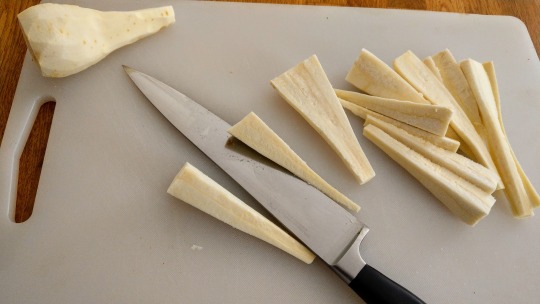
...then chop them in half the short way, toss them in a bowl with some oil—olive oil, in this case—spread them on a baking sheet, and season them with pepper, coarse salt, and some chile flakes. (I used ancho and bird's-eye chile flakes here.)
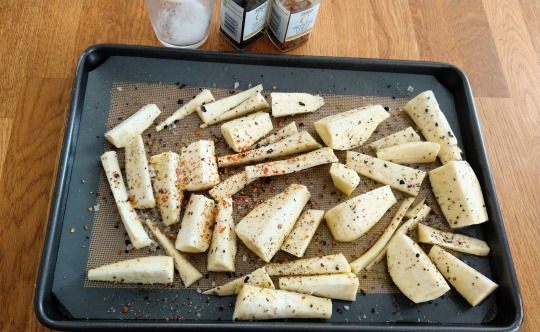
These then went into the oven for about half an hour, and came out like this.

While that was going on, I got a block of ready-cooked Polish snack bacon out of the freezer.
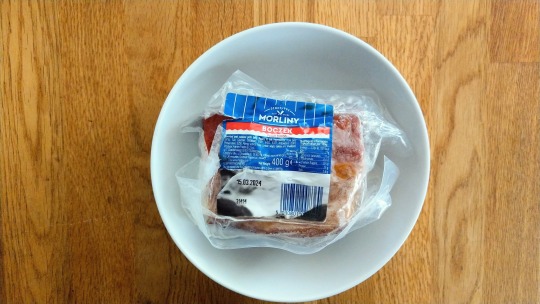
On its home turf, this is the kind of thing that turns up (among other ways) sliced very thin on afternoon-snack plates, with cheeses and breads. But we like to score it and roast it to sweat some of the fat out, and then use it in soups and stews and so forth.
So I scored this chunk on most of its sides, browned it in a skillet, then shoved the skillet into the oven for twenty minutes or so. Here's the bacon after it was done.
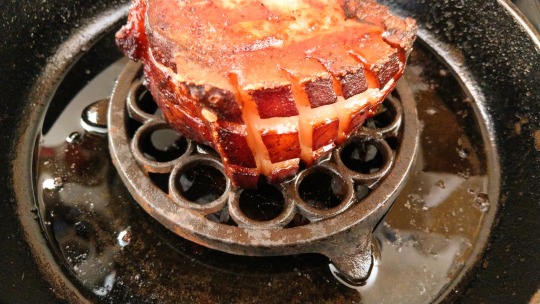
While it was cooking, I made about a liter of soup stock from a couple of stock cubes. If you can get pork stock cubes, they'd be best for this, but beef works fine.

This then went into the pot and was brought up to just-boiling while the bacon and the parsnips were chopped into more or less bite-sized chunks. After that, the meat and veg were added to the pot and the whole business was left to simmer for a couple of hours while I went off to do some line editing.
Finally I turned it off and left it on the stove overnight (our kitchen is quite cool, it was in no bacteriological danger from being left out this way) and then finished its simmering time around lunchtime today.
And here it is. (...Or was. It was very nice.)


...Anyway, this is only one of potentially thousands of takes on parsnip soup. Recipes for more robust versions—based on mashed parsnips and more vegetables, or different meats—are all over the place.
Meanwhile, as regards how much damage this soup could do to your copy of Good Omens if you dropped yours in it, I'd rate this at about 5 damage points out of 10. ...Call it 5.5 if you factor in the chiles. Soups along the boiled-and-mashed-parsnip spectrum would probably inflict damage more in the 7.50-8.0 range. But your results may vary: so I'll leave you all to your own experimentation.
394 notes
·
View notes
Text
about neil gaiman
earlier this year, prior to the allegations, I sent neil gaiman a message here on tumblr regarding the death of a friend. I did it because said friend used to be a fellow writer companion and collaborator to me as much as Sir Terry had been to him. I thought he would understand my pain; and maybe offer me an answer as to how did he manage to go back to the world of good omens without his dear friend by his side, as I've been unable to go back to the one me and my friend carved together. He never answered back.
Now, I'm glad he didn't. I'm even ashamed that I allowed the idea I had of him, this parassocial relationship I nurtured for so long, convince myself that it was a good idea in the first place. To give away such precious details to a, now more than ever, stranger.
As a brazilian, I suppose I could say we are particularly generous with the word "love". I can say I loved Neil Gaiman. I wouldn't say it was mostly for his writing, altought I do love Coraline and Ocean at the end of the lane, and Stardust (though I prefer some text from the movie script), but because whenever he would talk about stories in general, specially fairytales, that was how I felt too.
Someone on twitter already talked about this in a way, but... It really saddens me... it's the truth, isn't it? you have a man who writes about all that it's good and righteous. Who talks about stories and fairytales with such reverence, he knows... and yet, he acts in complete oposition. Does he even believe anything he says, or has it all become so intrinsically performative he just doesn't care...?
Personally, I'm inclined to believe he does believe in what he says about stories, which only makes his choices of action worst, as the tweet said. He knows how to be better, how it should be, but chooses not to. It's so damn painful. I do so hope he gets to pay for all of this. For abusing our faith, for using his power in such ways... just for having the nerve to sit here with that damn "quite nice, really"...
94 notes
·
View notes
Text
Anyone who's freaking out right now: take a deep breath and count to 10 (like Crowley - er, maybe not.) It's going to be OK.
Now here's some (hopefully grounding) words from someone who is not freaking out, nor particularly surprised by the allegations against Neil, AND who has no plans on abandoning this fandom:
Celebrity Worship is not and never will be a necessary or healthy component of fandom, the creation of art, or life in general.
If you are feeling completely unmoored right now, I'm telling you with all the compassion and gentleness of someone who has been in your shoes: it's time to untangle yourself from worshipping celebrities or interacting with them at all beyond their art. It's time to consciously deplatform celebrities.
Because if this is your first rodeo, it sure as hell will not be your last. And if it isn't your first rodeo, I promise this won't even be the most painful one.
Celebrities are not your friends. Neil, Michael, David are not your friends, or your LGBTQIA+ heroes, or One of the Good Ones. They are all just people. Mediocre, privileged, wealthy people capable of horrific and terrific acts. Every single one of them will eventually fall from the pedestal (some more spectacularly than others.)
I'm not talking about "separate the art from the artist" once you've found out the artists sucks. I'm talking about not worshipping the artist to begin with. Ever. Even if the artist seems good.
I'm seeing so many people afraid this means they can't engage in this fandom, and to that I say: This fandom space is a living, breathing community, and therefore morally neutral. There is good here, there is bad here, just like the people within it, just like there is in each of us. No one can change that or take this space from you or change what it is. Neil doing something morally wrong does not make you engaging with Good Omens morally wrong (it may change how you spend your money though but that's a different post.)
So take a step back or bury yourself in fanfiction, be angry or sad, do whatever you have to do to get through the initial panic and take care of yourself, and then start prying your fingers off these people.
Anyone who's struggling and reliving their trauma right now because of this, I'm holding you so so close and I'm so fucking sorry if this is bringing things back.
The primary reason I divorced myself from celebrity culture was my own trauma and not wanting things I loved to be inevitably ripped away from me or tainted.
Anyone who's using victim blaming language to try to defend Neil: you are hurting your fellow fandom members. Neil does not need your help. He's a big boy with a lot of money and a lot of very powerful friends.
Finally: ask yourself how you're going to feel when you inevitably find out David and Michael aren't Good People. My answer is: exactly the same as I did yesterday. What's yours?
Also note: everything I've said here does not change no matter what the outcome of the allegations are, but in my house we believe victims.
#good omens#neil gaiman#also this post doesn't even begin to get into why celebrity culture is detrimental to the world in general#and is quite simplified#but the moral is: deplatforming celebrities is your answer and it starts with yourself#ALSO no this doesnt mean you can't ogle David Tennant#it just means we dont give him awards for doing the bare minimum and call him our hero#also did yall miss Neil being a zionist this whole time or??
77 notes
·
View notes
Note
Can fat guys be dandys? I feel so ugly all the time. I want to be pretty. Not handsome. Pretty. Still a man. Just pretty.
ABSOLUTELY.
Like. Always, I know so many pretty fat men! Beautiful fat men! Lovely and gorgeous fat men!
One of my types of men I focus on REGULARLY is the eunuch-coded / implied gay men, who's generally like. An older man with delicate features, fat and pear-shaped, particularly with pretty, plump hands, a manicure, perhaps a soft voice and effete mannerisms - think Aziraphale in Terry Pratchett and Neil Gaiman's Good Omens book, think Varys in Game of Thrones, Hercule Poirot (book or maybe David Suchet) wouldn't be out of place.
I obviously write a lot of pretty fat men of varying descriptions and ages etc but like... Absolutely, fat men have always been out and being beautiful about it, it's just that our society is riddled with fatphobia and it sucks. :(
I don't know if you know Felix D'eon or Gray Sinning or Val/Bishop yet already but! Go have a browse! Also Harvey Guillen does soooo many beautiful photoshoots as a really beautiful man and! They're gorgeous!
234 notes
·
View notes